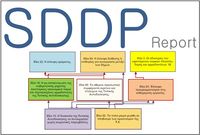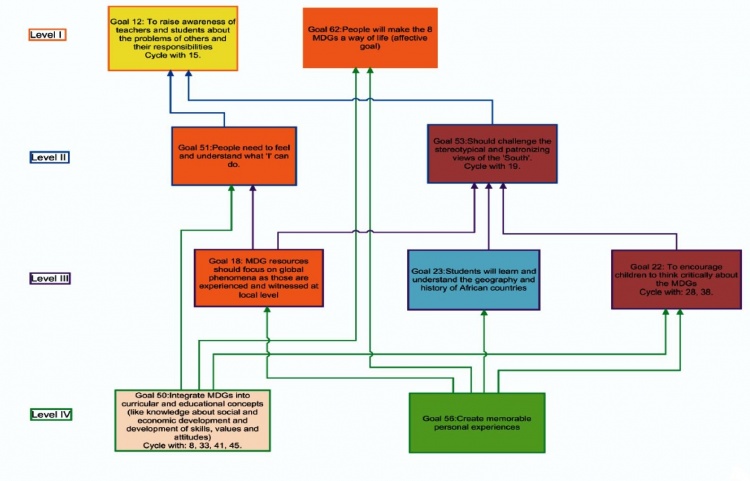SDDP with teachers and -training institutes to develop goals and structure for MDG materials to be produced
|
Executive Summary
This paper reports the results of an SDDP workshop organized by Future Worlds Center in an attemp to create a vision map for the development of goals and structure of MDG materials to be produced. The workshop was organized using the structured dialogic design process (SDDP) approach within the context of a rich web-based communication environment. The workshop was facilitated by Yiannis Laouris and Mrs. Mary Ioannou and it was attended by 33 participants from 6 countries.
Generation and Clarification
During the first session of the co-laboratory, the participants engaged in a structured dialogue focusing on the following triggering question:
What goals should MDG resources satisfy to meet the requirements of TeachMDGs project?
The goals were clarified in the plenary session, thus enabling participants
o achieve a better understanding of the views of other members of the Consortium
as well as to greatly expand their own horizon regarding the breadth
and depth of issues which need to be taken into account.
Amend Clusters
In response to the TQ, the 33 participants came up with 65 characteristics, which were categorized in the following clusters:
- Guidelines for Resources
- Effecting Attitudinal Change
- Southern Perspectives
- Inspiring Tools
- Data
- Actions
- Curriculum
- Critical Thinking
- Specific Solutions
- Educators
- Not Only Children
- NGO’s
The descriptors were clustered in an interactive manner, thus providing opportunities for further and deeper clarifications of salient distinctions between separate ideas.
Voting
After having generated, clarified, and clustered the obstacles, each participant chose five factors that they thought were the most important. The voting results were used to select factors for the subsequent structuring phase to identify inter-relations among the generated factors. The votes were widely spread among most of the descriptors.
Influence MAP
Following the voting process, 46 ideas received one or more votes and were structured to create the influence MAP shown below.
According to the participants of this workshop, the descriptors which appear to be the most influential were:
- Descriptor# 50 Integrate MDGs into curricular and educational concepts (like knowledge about social and economic development and development of skills, values and attitudes)
- Descriptor#33 Resources that give teachers the tools and methodologies to teach using MDGs
- Descriptor#45 School staff should be enabled to apply the developed resources in daily school life
- Descriptor#22 To encourage children to think critically about the MDGs
- Descriptor#18 MDG resources should focus on global phenomena as those are experienced and witnessed at local level
The highly complex ‘influence map’ consists of four different levels of influence. Descriptors at the
bottom are considered to be the most influential. Making progress or
achieving results in the bottom descriptors makes it a lot easier to
address those that lie higher in the map.
In summary, almost all participants approved that the following
goals are the most influential and agreed that further actions must
address these root causes satisfactorily.
Partners
The coordinating organization of this project is the Future Worlds Center (Cyprus Neuroscience and Technology Institute). The project’s partner organizations are:
The associates of the project team are:
- Management Center of the Mediterranean in Cyprus
- Vilnius Pedagogical University in Lithuania
- Vytautas Magnus University in Lithuania
- Pedagogical Institute in Cyprus
- Cameroonian Diaspora in Cyprus
- International Student Association of Cyprus
- Mouvement Universel pour la Santé et l’ Education in D.R Congo
Participants
| Name | Country |
|---|---|
| Yordanka Andreeva | Bulgaria |
| Adriana Baytcheva | Bulgaria |
| Stanka Samokovska | Bulgaria |
| Liuba Batembergska | Bulgaria |
| Rumyan Sechkov | Bulgaria |
| Marin Ivanov | Bulgaria |
| Susan McIntosh | Scotland |
| Isabel Ross | Scotland |
| Laimute Zukauskiene | Lithuania |
| Irena Urbstiene | Lithuania |
| Kerstin Wittig | Cyprus |
| Nicolina Markidou | Cyprus |
| Yiannis Laouris | Cyprus |
| Mary Ioannou | Cyprus |
| Maria Loizou | Cyprus |
| Stella Gavriel | Cyprus |
| Iliana Siaili | Cyprus |
| Huseyin Yaratan | Cyprus |
| Nihat Ekizoglu | Cyprus |
| Ayten Sururi | Cyprus |
| Mari Kinks | Estonia |
| Maari Ross | Estonia |
| Marje Pihlak | Estonia |
| Kai Kitsing | Estonia |
| Birgit Tammjõe | Estonia |
| Paul Senosi | Estonia |
| Kaarel Haav | Estonia |
| Erika Sari | Estonia |
| Charles John Cardoso | Estonia |
| Arian Sarwiri | Afghanistan |
| Mohammed Samir | Afghanistan |





